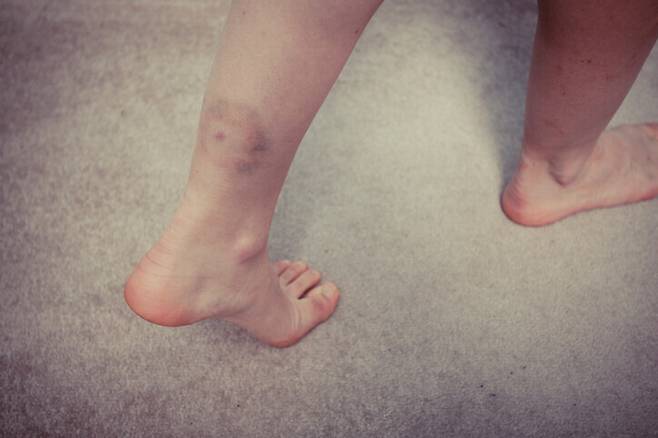S. Korea joins list of countries that ban corporal punishment of children
전체 맥락을 이해하기 위해서는 본문 보기를 권장합니다.
The Civil Act's article on parent's disciplinary rights states that "the person of parental authority may, in order to protect or educate his or her child, take necessary disciplinary action against the child."
The amendment will also impact the stance of courts on the corporal punishment of children. In 2002, the Supreme Court upheld the conviction of a father on intimidation charges for threatening to "kill" his three-year-old daughter with a baseball bat, but also ruled that the right to disciplinary action against children "should be exercised through corresponding means within the scope of what is necessary for the healthy nurturing of character."
이 글자크기로 변경됩니다.
(예시) 가장 빠른 뉴스가 있고 다양한 정보, 쌍방향 소통이 숨쉬는 다음뉴스를 만나보세요. 다음뉴스는 국내외 주요이슈와 실시간 속보, 문화생활 및 다양한 분야의 뉴스를 입체적으로 전달하고 있습니다.

Amid growing public anger over the death of a toddler from child abuse, the National Assembly moved on Jan. 8 to amend the Civil Act to remove a provision concerning the rights of parents to discipline their children.
The next question is whether the deletion of that provision — which has been used as a basis for permitting corporal punishment since 1958 — will change the widespread view that corporal punishment is an unavoidable means to disciplining children.
The Civil Act’s article on parent’s disciplinary rights states that “the person of parental authority may, in order to protect or educate his or her child, take necessary disciplinary action against the child.”
This is in direct conflict with a 2015 amendment of the Child Welfare Act, which states that “No protectors of children shall inflict physical pain or psychological pain [. . .] on the children.”

The Global Initiative to End All Corporal Punishment of Children, an international human rights group that releases annual lists of countries prohibiting corporal punishment, said in March 2020 that South Korea has not banned corporate punishment due to the “disciplinary action” provision in its Civil Act. Since Sweden became the first country to prohibit corporal punishment of children in 1979, other countries have also legislated bans, including Germany, France, Spain, Kenya, Tunisia, Brazil, and Paraguay.
In its most recent announcement last July, the group listed 60 countries as having prohibited corporate punishment. This included Japan, which in April 2020 implemented an amendment to its Child Welfare Law including a ban on corporal punishment by parents.
The amendment will also impact the stance of courts on the corporal punishment of children. In 2002, the Supreme Court upheld the conviction of a father on intimidation charges for threatening to “kill” his three-year-old daughter with a baseball bat, but also ruled that the right to disciplinary action against children “should be exercised through corresponding means within the scope of what is necessary for the healthy nurturing of character.”
In other words, it determined that corporal punishment was acceptable as a “corresponding means within the scope of what is necessary.” Indeed, many parents indicted on child abuse charges have cited the disciplinary action provision to argue that their actions constituted legitimate “education.”
Some observers are saying that the legislative decision should usher in changes to widespread views seeing corporal punishment as an “unavoidable” part of education. A 2018 report by the Korea Institute for Health and Social Affairs (KIHASA) found that four in 10 parents still viewed corporal punishment as necessary when raising children.
Koh Woo-hyun, a manager with Save the Children Korea, said, “The removal of the disciplinary action provision should be a starting point as the government works to raise awareness of the law’s amendment so that we can reach a societal consensus that the corporal punishment of children is no longer to be permitted.”
By Shin Min-jung, staff reporter
Please direct comments or questions to [english@hani.co.kr]
Copyright © 한겨레. 무단전재 및 재배포 금지.
- 건강한 50~64살도 백신 우선접종 검토…청소년 접종계획은 아직
- 직원과 함께 증발한 카지노 145억, 왜 제주에 보관했나
- [포토] “유가족 없는 정인이 곁에”…검찰 앞 파란 바람개비
- [왜냐면] 입양모입니다, 정인이의 죽음에 대해 대통령께 말씀드립니다 / 정은주
- ‘이루다’ 대화 활용 동의 받았나?…개인정보보호위, 들여다 본다
- [신년사 전문] 문 대통령 “전국민 코로나 백신 무료접종”
- [유레카] 한국에 이란 동결자금이 가장 많은 이유는 / 박민희
- 일본정부 상대 ‘위안부’ 피해 2차 선고, 이틀 앞두고 연기
- 화성시 쿠팡물류센터서 50대 노동자 숨진 채 발견
- ‘NC와 계약’ 파슨스 “미국서 새벽에 한국 야구 시청”